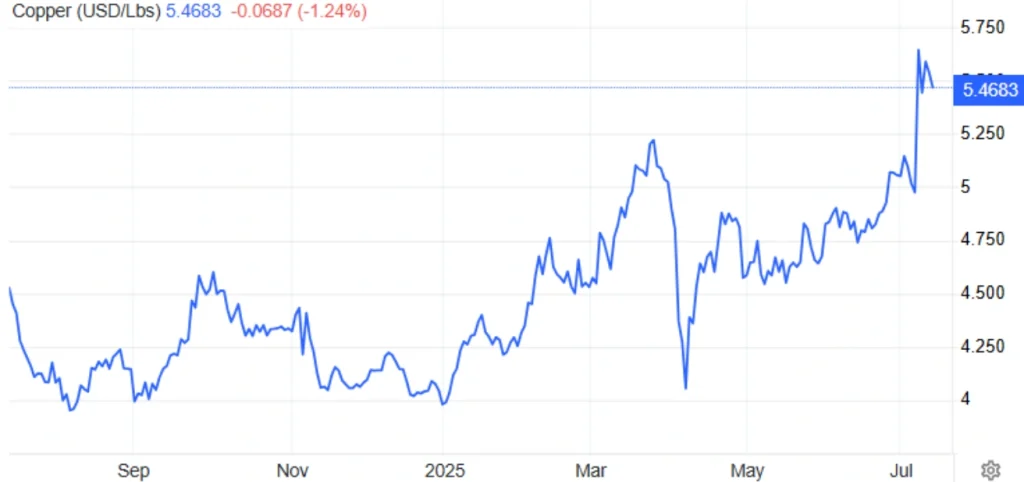
Copper Prices Dip to $5.50 as Trump’s New Tariffs Stir Trade Tensions
📌 Key Takeaways
- Copper futures fell to $5.50/lb, down from last week’s highs
- Trump announces 30% tariffs on EU and Mexico imports, effective August 1
- EU, Canada, Japan explore coordinated countermeasures
- 50% copper tariff still set to begin August 1 to boost U.S. production
- Analysts warn of domestic supply bottlenecks, with only 2 US smelters
- Nearly 50% of US copper is imported, raising market uncertainty
📊 Copper Tariff and Market Impact Snapshot
| Date | Policy Announcement | Copper Price (USD/lb) | Market Reaction |
|---|---|---|---|
| Last Week | 50% tariff on copper imports (starting Aug. 1) | $5.60+ | Copper rallied to highs |
| Today | 30% tariff on EU & Mexico imports | $5.50 | Pullback on risk-off tone |
📉 Copper Futures Slide as Global Trade Tensions Resurface
Copper prices dropped to $5.50 per pound on Monday, retreating from near-record highs reached last week. The downturn followed President Trump’s latest tariff announcement, escalating global trade concerns.
The new 30% tariff on imports from the EU and Mexico, effective August 1, triggered immediate concerns about retaliatory measures and supply chain disruptions. Global risk appetite weakened, and copper traders began trimming bullish positions.
Meanwhile, the 50% tariff on general copper imports, also set to begin August 1, remains in place. The administration says the goal is to strengthen domestic production and reduce dependency on foreign refined copper.

EU, Canada, Japan Consider Joint Response
In response to the sweeping tariffs, European Union leaders are ramping up talks with Canada and Japan, exploring coordinated trade actions. Sources suggest the discussions may lead to joint tariffs or WTO complaints, potentially adding friction to the already fragile global trade environment.
This backdrop of escalating geopolitical uncertainty is dampening industrial metals demand, even as long-term fundamentals remain strong.
Read More: Trump Family-Backed American Bitcoin Raises $220M
🏭 Supply Bottleneck Worries Loom in U.S. Copper Market
While the U.S. aims to repatriate copper supply chains, analysts caution that structural limitations may hinder success. The U.S. currently imports nearly half of the copper it consumes, and has only two operating copper smelters.
These constraints raise concerns about potential bottlenecks in refining and distribution. Without sufficient domestic infrastructure, the new tariff could lead to higher input costs for U.S. manufacturers while doing little to improve production capacity in the short term.
According to analysts at MetalEdge:
“The intention is clear, reduce foreign reliance. But the U.S. lacks the immediate capacity to absorb this supply shock efficiently.”
Outlook: What’s Next for Copper?
Market participants are now closely watching:
- 🧾 Potential counter-tariff announcements from the EU, Canada, or Japan
- 🏗️ U.S. investment plans for refining and smelting capacity
- 📦 Copper inventory data and supply chain shifts
Despite today’s pullback, copper remains a strategic commodity, central to defense, semiconductors, and clean tech infrastructure. If tariffs trigger supply disruptions, prices could rebound quickly.
💬 Final Thoughts
The short-term price dip may offer a brief breather for industrial buyers, but the underlying policy and supply uncertainties are far from over. Traders should brace for continued volatility as August 1 approaches.
📢 Are these tariffs a long-term win or a short-term risk? Drop your thoughts below and follow us for real-time metals market updates.
Share
Hot topics

Best broker for gold trading
There’s always been a certain magic about gold. Before online charts and trading applications, people stored their wealth in coins and bars, trusting that gold would retain its value during...
Read more




Submit comment
Your email address will not be published. Required fields are marked *